An Analysis of Personality & Intelligence in Psychology Course
VerifiedAdded on 2023/01/11
|8
|2651
|48
Essay
AI Summary
This psychology essay explores the intricate relationship between personality and intelligence, delving into the physiological theories of extraversion and neuroticism. It examines Eysenck's arousal theory and Gray's RST, evaluating their supporting evidence within the context of the PEN model. The essay further investigates the significant impact of culture on both personality and intelligence, analyzing how cultural values, norms, and beliefs shape individual behaviors, thought processes, and intellectual development. It considers various cultural syndromes and their influence on traits, as well as the role of cultural factors in intelligence, such as education, health, and environmental influences. This essay provides a comprehensive analysis of key psychological concepts and their interplay with cultural factors.
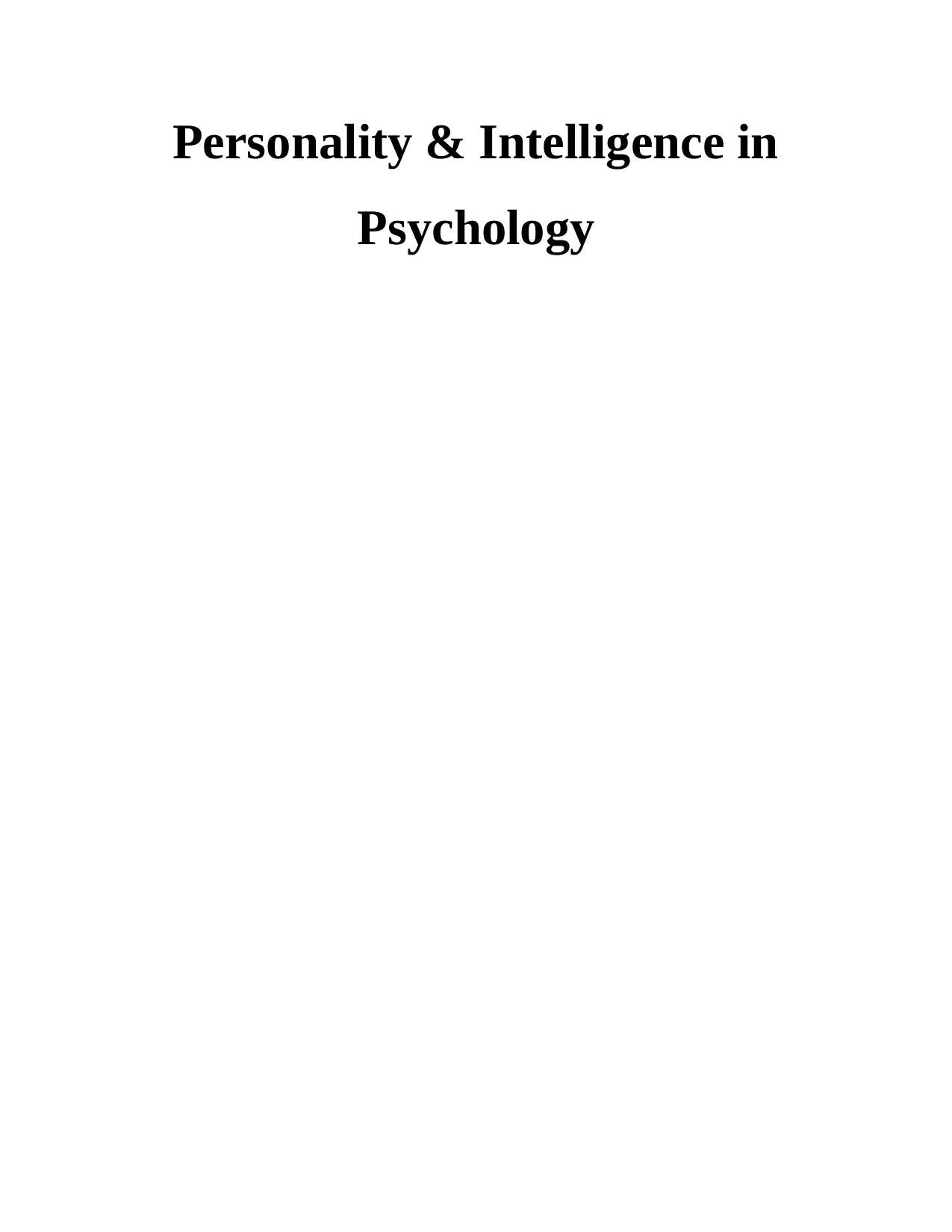
Personality & Intelligence in
Psychology
Psychology
Paraphrase This Document
Need a fresh take? Get an instant paraphrase of this document with our AI Paraphraser
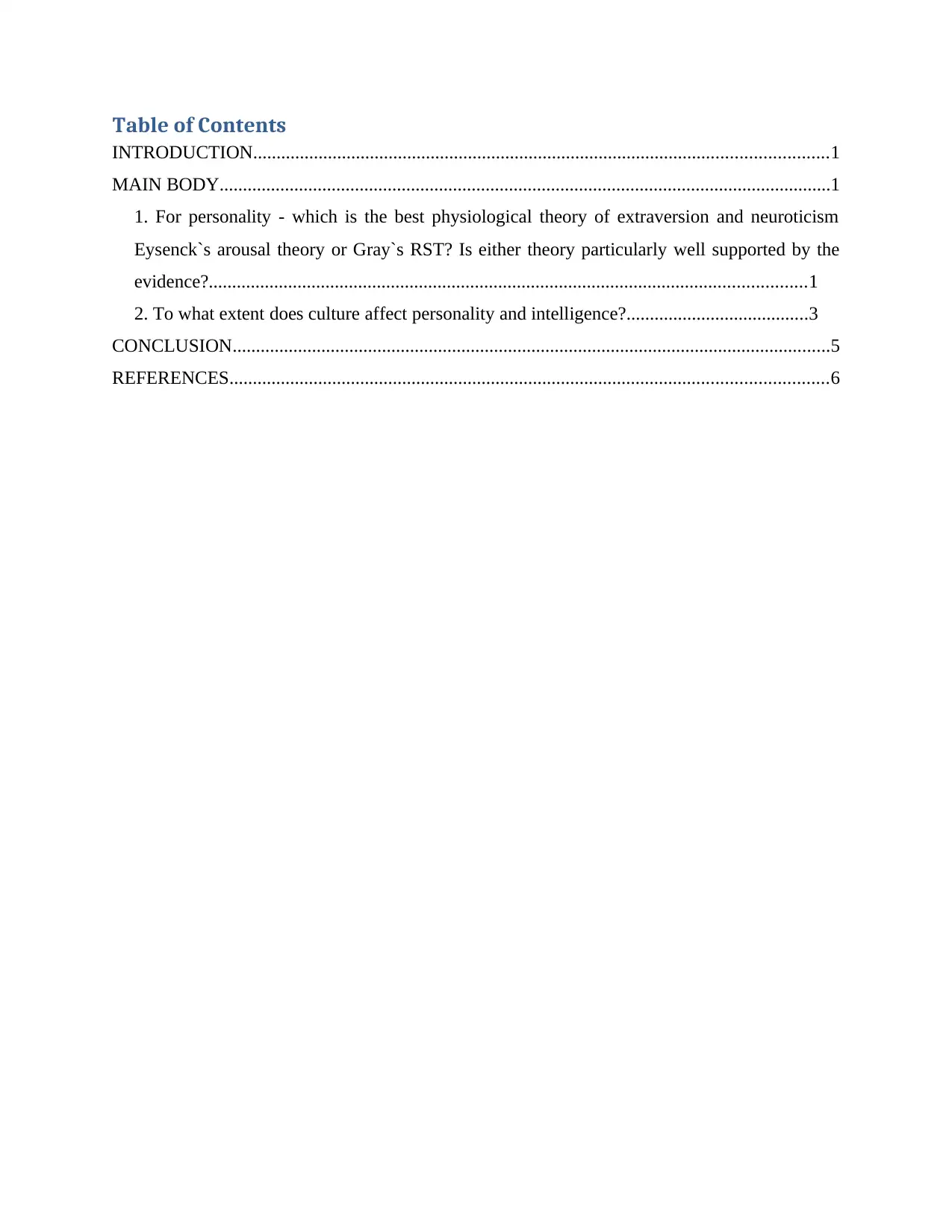
Table of Contents
INTRODUCTION...........................................................................................................................1
MAIN BODY...................................................................................................................................1
1. For personality - which is the best physiological theory of extraversion and neuroticism
Eysenck`s arousal theory or Gray`s RST? Is either theory particularly well supported by the
evidence?................................................................................................................................1
2. To what extent does culture affect personality and intelligence?.......................................3
CONCLUSION................................................................................................................................5
REFERENCES................................................................................................................................6
INTRODUCTION...........................................................................................................................1
MAIN BODY...................................................................................................................................1
1. For personality - which is the best physiological theory of extraversion and neuroticism
Eysenck`s arousal theory or Gray`s RST? Is either theory particularly well supported by the
evidence?................................................................................................................................1
2. To what extent does culture affect personality and intelligence?.......................................3
CONCLUSION................................................................................................................................5
REFERENCES................................................................................................................................6
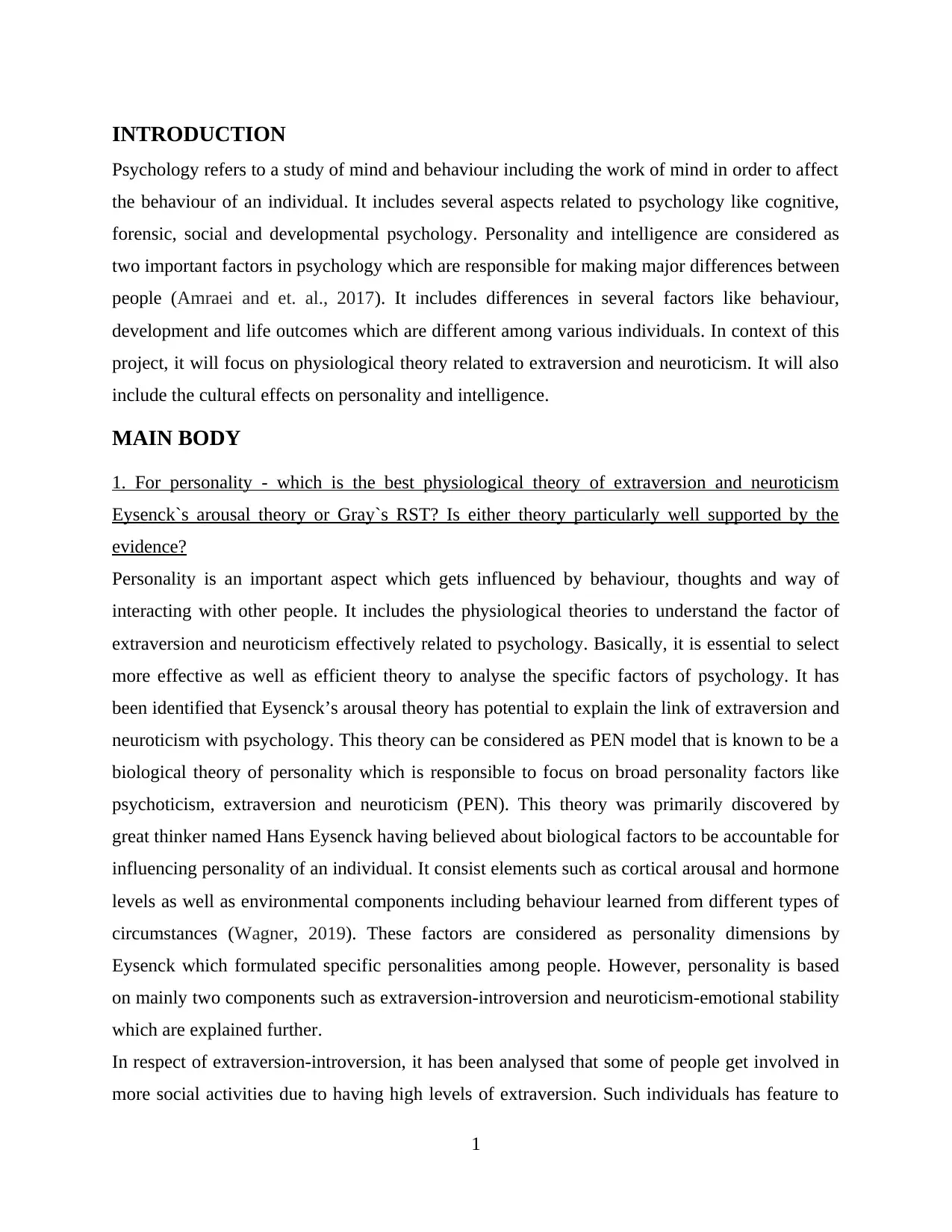
INTRODUCTION
Psychology refers to a study of mind and behaviour including the work of mind in order to affect
the behaviour of an individual. It includes several aspects related to psychology like cognitive,
forensic, social and developmental psychology. Personality and intelligence are considered as
two important factors in psychology which are responsible for making major differences between
people (Amraei and et. al., 2017). It includes differences in several factors like behaviour,
development and life outcomes which are different among various individuals. In context of this
project, it will focus on physiological theory related to extraversion and neuroticism. It will also
include the cultural effects on personality and intelligence.
MAIN BODY
1. For personality - which is the best physiological theory of extraversion and neuroticism
Eysenck`s arousal theory or Gray`s RST? Is either theory particularly well supported by the
evidence?
Personality is an important aspect which gets influenced by behaviour, thoughts and way of
interacting with other people. It includes the physiological theories to understand the factor of
extraversion and neuroticism effectively related to psychology. Basically, it is essential to select
more effective as well as efficient theory to analyse the specific factors of psychology. It has
been identified that Eysenck’s arousal theory has potential to explain the link of extraversion and
neuroticism with psychology. This theory can be considered as PEN model that is known to be a
biological theory of personality which is responsible to focus on broad personality factors like
psychoticism, extraversion and neuroticism (PEN). This theory was primarily discovered by
great thinker named Hans Eysenck having believed about biological factors to be accountable for
influencing personality of an individual. It consist elements such as cortical arousal and hormone
levels as well as environmental components including behaviour learned from different types of
circumstances (Wagner, 2019). These factors are considered as personality dimensions by
Eysenck which formulated specific personalities among people. However, personality is based
on mainly two components such as extraversion-introversion and neuroticism-emotional stability
which are explained further.
In respect of extraversion-introversion, it has been analysed that some of people get involved in
more social activities due to having high levels of extraversion. Such individuals has feature to
1
Psychology refers to a study of mind and behaviour including the work of mind in order to affect
the behaviour of an individual. It includes several aspects related to psychology like cognitive,
forensic, social and developmental psychology. Personality and intelligence are considered as
two important factors in psychology which are responsible for making major differences between
people (Amraei and et. al., 2017). It includes differences in several factors like behaviour,
development and life outcomes which are different among various individuals. In context of this
project, it will focus on physiological theory related to extraversion and neuroticism. It will also
include the cultural effects on personality and intelligence.
MAIN BODY
1. For personality - which is the best physiological theory of extraversion and neuroticism
Eysenck`s arousal theory or Gray`s RST? Is either theory particularly well supported by the
evidence?
Personality is an important aspect which gets influenced by behaviour, thoughts and way of
interacting with other people. It includes the physiological theories to understand the factor of
extraversion and neuroticism effectively related to psychology. Basically, it is essential to select
more effective as well as efficient theory to analyse the specific factors of psychology. It has
been identified that Eysenck’s arousal theory has potential to explain the link of extraversion and
neuroticism with psychology. This theory can be considered as PEN model that is known to be a
biological theory of personality which is responsible to focus on broad personality factors like
psychoticism, extraversion and neuroticism (PEN). This theory was primarily discovered by
great thinker named Hans Eysenck having believed about biological factors to be accountable for
influencing personality of an individual. It consist elements such as cortical arousal and hormone
levels as well as environmental components including behaviour learned from different types of
circumstances (Wagner, 2019). These factors are considered as personality dimensions by
Eysenck which formulated specific personalities among people. However, personality is based
on mainly two components such as extraversion-introversion and neuroticism-emotional stability
which are explained further.
In respect of extraversion-introversion, it has been analysed that some of people get involved in
more social activities due to having high levels of extraversion. Such individuals has feature to
1
⊘ This is a preview!⊘
Do you want full access?
Subscribe today to unlock all pages.

Trusted by 1+ million students worldwide
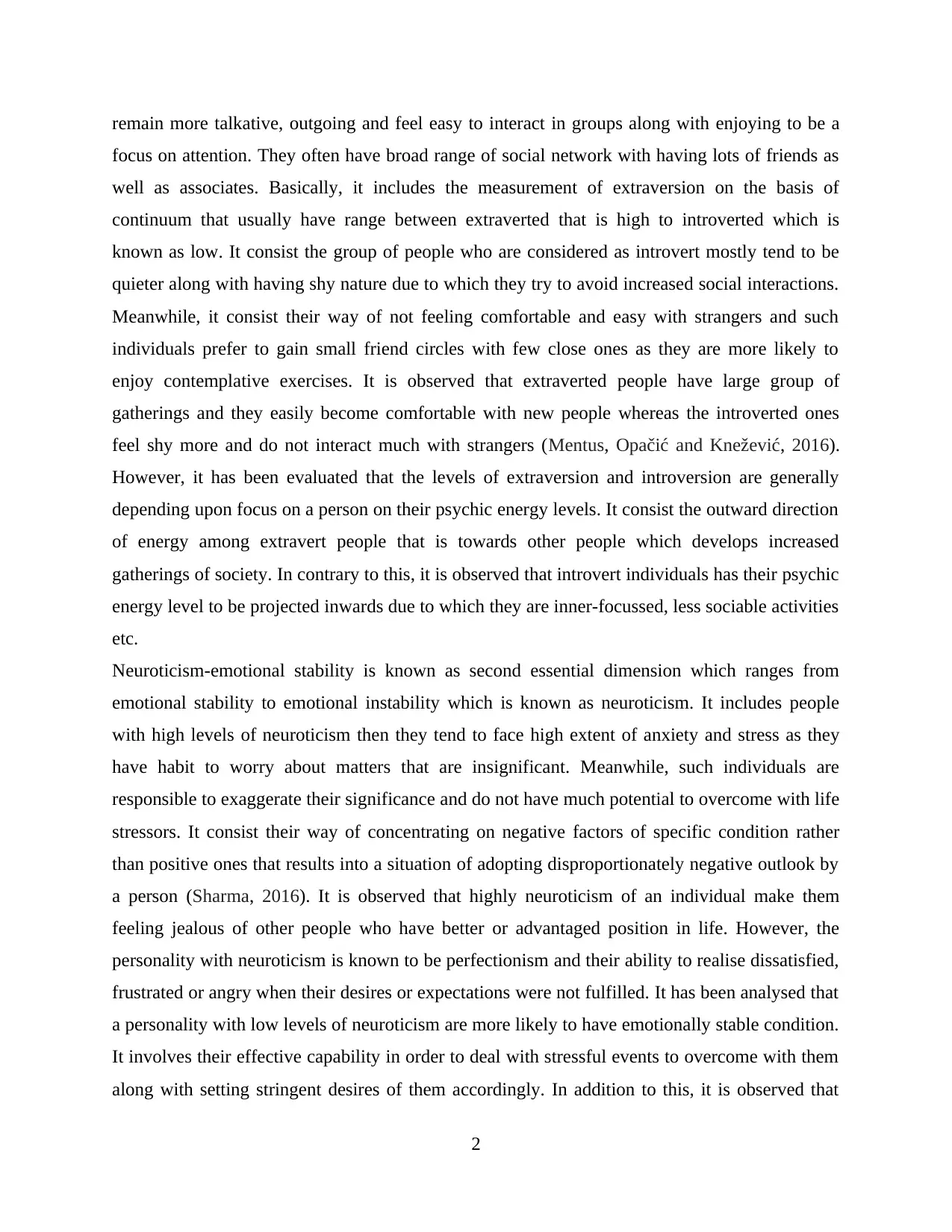
remain more talkative, outgoing and feel easy to interact in groups along with enjoying to be a
focus on attention. They often have broad range of social network with having lots of friends as
well as associates. Basically, it includes the measurement of extraversion on the basis of
continuum that usually have range between extraverted that is high to introverted which is
known as low. It consist the group of people who are considered as introvert mostly tend to be
quieter along with having shy nature due to which they try to avoid increased social interactions.
Meanwhile, it consist their way of not feeling comfortable and easy with strangers and such
individuals prefer to gain small friend circles with few close ones as they are more likely to
enjoy contemplative exercises. It is observed that extraverted people have large group of
gatherings and they easily become comfortable with new people whereas the introverted ones
feel shy more and do not interact much with strangers (Mentus, Opačić and Knežević, 2016).
However, it has been evaluated that the levels of extraversion and introversion are generally
depending upon focus on a person on their psychic energy levels. It consist the outward direction
of energy among extravert people that is towards other people which develops increased
gatherings of society. In contrary to this, it is observed that introvert individuals has their psychic
energy level to be projected inwards due to which they are inner-focussed, less sociable activities
etc.
Neuroticism-emotional stability is known as second essential dimension which ranges from
emotional stability to emotional instability which is known as neuroticism. It includes people
with high levels of neuroticism then they tend to face high extent of anxiety and stress as they
have habit to worry about matters that are insignificant. Meanwhile, such individuals are
responsible to exaggerate their significance and do not have much potential to overcome with life
stressors. It consist their way of concentrating on negative factors of specific condition rather
than positive ones that results into a situation of adopting disproportionately negative outlook by
a person (Sharma, 2016). It is observed that highly neuroticism of an individual make them
feeling jealous of other people who have better or advantaged position in life. However, the
personality with neuroticism is known to be perfectionism and their ability to realise dissatisfied,
frustrated or angry when their desires or expectations were not fulfilled. It has been analysed that
a personality with low levels of neuroticism are more likely to have emotionally stable condition.
It involves their effective capability in order to deal with stressful events to overcome with them
along with setting stringent desires of them accordingly. In addition to this, it is observed that
2
focus on attention. They often have broad range of social network with having lots of friends as
well as associates. Basically, it includes the measurement of extraversion on the basis of
continuum that usually have range between extraverted that is high to introverted which is
known as low. It consist the group of people who are considered as introvert mostly tend to be
quieter along with having shy nature due to which they try to avoid increased social interactions.
Meanwhile, it consist their way of not feeling comfortable and easy with strangers and such
individuals prefer to gain small friend circles with few close ones as they are more likely to
enjoy contemplative exercises. It is observed that extraverted people have large group of
gatherings and they easily become comfortable with new people whereas the introverted ones
feel shy more and do not interact much with strangers (Mentus, Opačić and Knežević, 2016).
However, it has been evaluated that the levels of extraversion and introversion are generally
depending upon focus on a person on their psychic energy levels. It consist the outward direction
of energy among extravert people that is towards other people which develops increased
gatherings of society. In contrary to this, it is observed that introvert individuals has their psychic
energy level to be projected inwards due to which they are inner-focussed, less sociable activities
etc.
Neuroticism-emotional stability is known as second essential dimension which ranges from
emotional stability to emotional instability which is known as neuroticism. It includes people
with high levels of neuroticism then they tend to face high extent of anxiety and stress as they
have habit to worry about matters that are insignificant. Meanwhile, such individuals are
responsible to exaggerate their significance and do not have much potential to overcome with life
stressors. It consist their way of concentrating on negative factors of specific condition rather
than positive ones that results into a situation of adopting disproportionately negative outlook by
a person (Sharma, 2016). It is observed that highly neuroticism of an individual make them
feeling jealous of other people who have better or advantaged position in life. However, the
personality with neuroticism is known to be perfectionism and their ability to realise dissatisfied,
frustrated or angry when their desires or expectations were not fulfilled. It has been analysed that
a personality with low levels of neuroticism are more likely to have emotionally stable condition.
It involves their effective capability in order to deal with stressful events to overcome with them
along with setting stringent desires of them accordingly. In addition to this, it is observed that
2
Paraphrase This Document
Need a fresh take? Get an instant paraphrase of this document with our AI Paraphraser
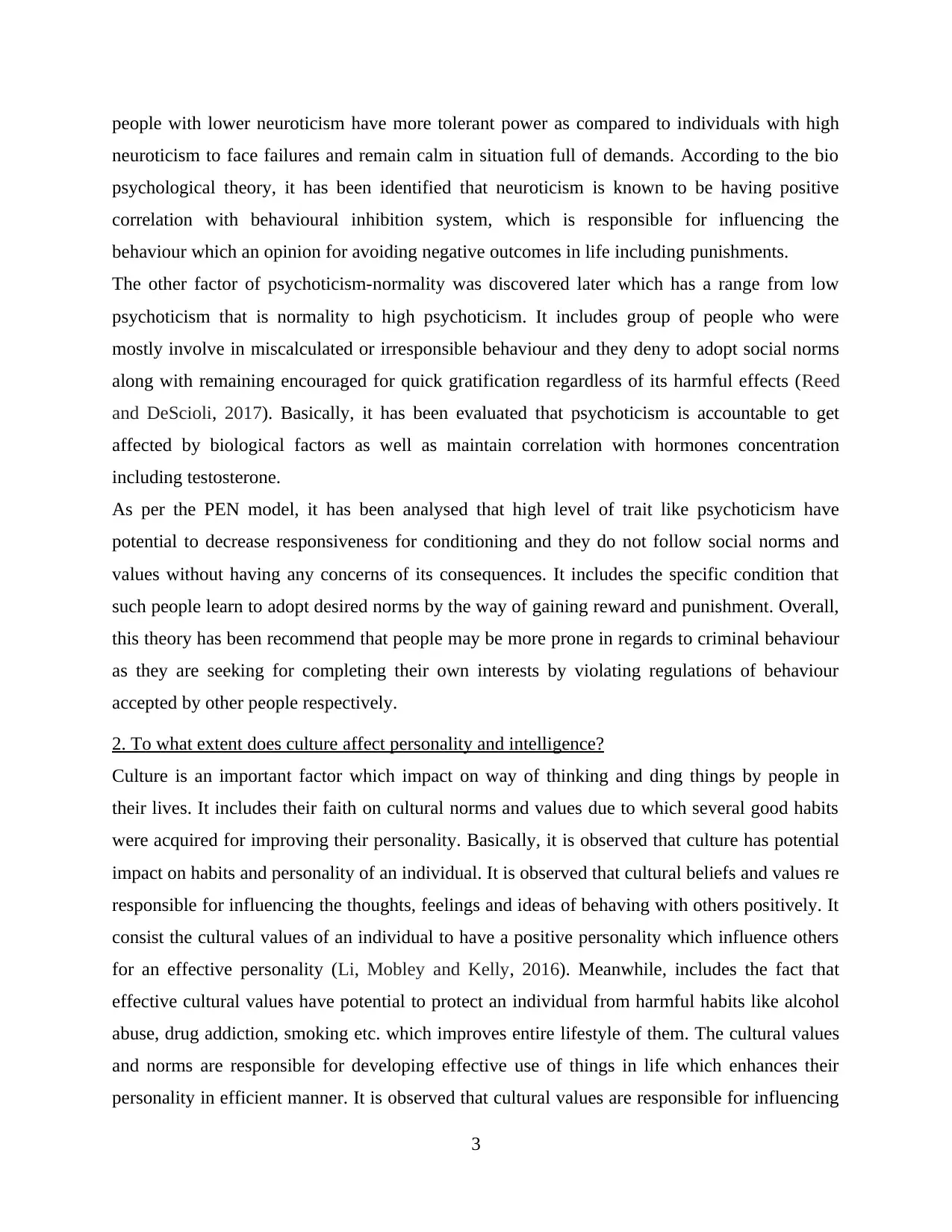
people with lower neuroticism have more tolerant power as compared to individuals with high
neuroticism to face failures and remain calm in situation full of demands. According to the bio
psychological theory, it has been identified that neuroticism is known to be having positive
correlation with behavioural inhibition system, which is responsible for influencing the
behaviour which an opinion for avoiding negative outcomes in life including punishments.
The other factor of psychoticism-normality was discovered later which has a range from low
psychoticism that is normality to high psychoticism. It includes group of people who were
mostly involve in miscalculated or irresponsible behaviour and they deny to adopt social norms
along with remaining encouraged for quick gratification regardless of its harmful effects (Reed
and DeScioli, 2017). Basically, it has been evaluated that psychoticism is accountable to get
affected by biological factors as well as maintain correlation with hormones concentration
including testosterone.
As per the PEN model, it has been analysed that high level of trait like psychoticism have
potential to decrease responsiveness for conditioning and they do not follow social norms and
values without having any concerns of its consequences. It includes the specific condition that
such people learn to adopt desired norms by the way of gaining reward and punishment. Overall,
this theory has been recommend that people may be more prone in regards to criminal behaviour
as they are seeking for completing their own interests by violating regulations of behaviour
accepted by other people respectively.
2. To what extent does culture affect personality and intelligence?
Culture is an important factor which impact on way of thinking and ding things by people in
their lives. It includes their faith on cultural norms and values due to which several good habits
were acquired for improving their personality. Basically, it is observed that culture has potential
impact on habits and personality of an individual. It is observed that cultural beliefs and values re
responsible for influencing the thoughts, feelings and ideas of behaving with others positively. It
consist the cultural values of an individual to have a positive personality which influence others
for an effective personality (Li, Mobley and Kelly, 2016). Meanwhile, includes the fact that
effective cultural values have potential to protect an individual from harmful habits like alcohol
abuse, drug addiction, smoking etc. which improves entire lifestyle of them. The cultural values
and norms are responsible for developing effective use of things in life which enhances their
personality in efficient manner. It is observed that cultural values are responsible for influencing
3
neuroticism to face failures and remain calm in situation full of demands. According to the bio
psychological theory, it has been identified that neuroticism is known to be having positive
correlation with behavioural inhibition system, which is responsible for influencing the
behaviour which an opinion for avoiding negative outcomes in life including punishments.
The other factor of psychoticism-normality was discovered later which has a range from low
psychoticism that is normality to high psychoticism. It includes group of people who were
mostly involve in miscalculated or irresponsible behaviour and they deny to adopt social norms
along with remaining encouraged for quick gratification regardless of its harmful effects (Reed
and DeScioli, 2017). Basically, it has been evaluated that psychoticism is accountable to get
affected by biological factors as well as maintain correlation with hormones concentration
including testosterone.
As per the PEN model, it has been analysed that high level of trait like psychoticism have
potential to decrease responsiveness for conditioning and they do not follow social norms and
values without having any concerns of its consequences. It includes the specific condition that
such people learn to adopt desired norms by the way of gaining reward and punishment. Overall,
this theory has been recommend that people may be more prone in regards to criminal behaviour
as they are seeking for completing their own interests by violating regulations of behaviour
accepted by other people respectively.
2. To what extent does culture affect personality and intelligence?
Culture is an important factor which impact on way of thinking and ding things by people in
their lives. It includes their faith on cultural norms and values due to which several good habits
were acquired for improving their personality. Basically, it is observed that culture has potential
impact on habits and personality of an individual. It is observed that cultural beliefs and values re
responsible for influencing the thoughts, feelings and ideas of behaving with others positively. It
consist the cultural values of an individual to have a positive personality which influence others
for an effective personality (Li, Mobley and Kelly, 2016). Meanwhile, includes the fact that
effective cultural values have potential to protect an individual from harmful habits like alcohol
abuse, drug addiction, smoking etc. which improves entire lifestyle of them. The cultural values
and norms are responsible for developing effective use of things in life which enhances their
personality in efficient manner. It is observed that cultural values are responsible for influencing
3
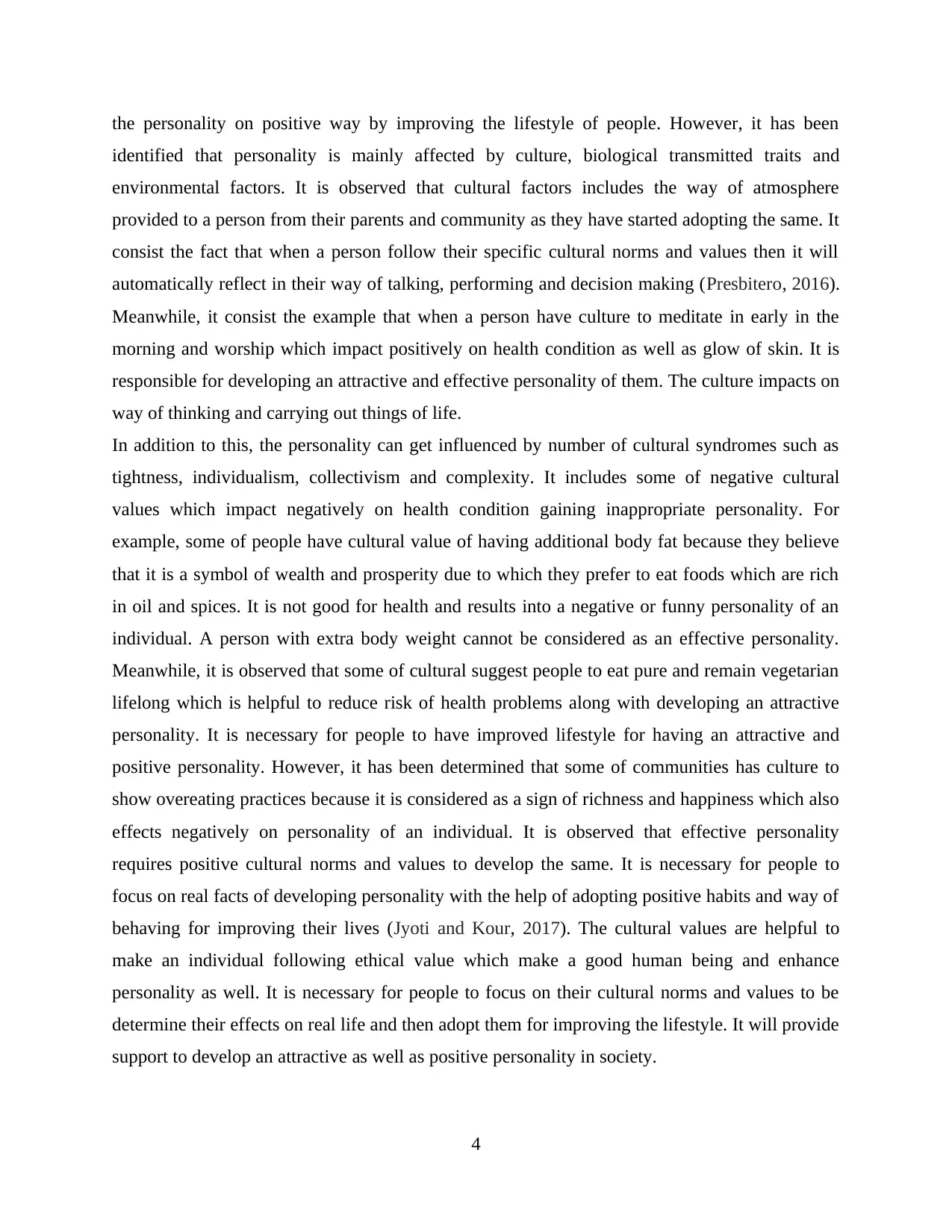
the personality on positive way by improving the lifestyle of people. However, it has been
identified that personality is mainly affected by culture, biological transmitted traits and
environmental factors. It is observed that cultural factors includes the way of atmosphere
provided to a person from their parents and community as they have started adopting the same. It
consist the fact that when a person follow their specific cultural norms and values then it will
automatically reflect in their way of talking, performing and decision making (Presbitero, 2016).
Meanwhile, it consist the example that when a person have culture to meditate in early in the
morning and worship which impact positively on health condition as well as glow of skin. It is
responsible for developing an attractive and effective personality of them. The culture impacts on
way of thinking and carrying out things of life.
In addition to this, the personality can get influenced by number of cultural syndromes such as
tightness, individualism, collectivism and complexity. It includes some of negative cultural
values which impact negatively on health condition gaining inappropriate personality. For
example, some of people have cultural value of having additional body fat because they believe
that it is a symbol of wealth and prosperity due to which they prefer to eat foods which are rich
in oil and spices. It is not good for health and results into a negative or funny personality of an
individual. A person with extra body weight cannot be considered as an effective personality.
Meanwhile, it is observed that some of cultural suggest people to eat pure and remain vegetarian
lifelong which is helpful to reduce risk of health problems along with developing an attractive
personality. It is necessary for people to have improved lifestyle for having an attractive and
positive personality. However, it has been determined that some of communities has culture to
show overeating practices because it is considered as a sign of richness and happiness which also
effects negatively on personality of an individual. It is observed that effective personality
requires positive cultural norms and values to develop the same. It is necessary for people to
focus on real facts of developing personality with the help of adopting positive habits and way of
behaving for improving their lives (Jyoti and Kour, 2017). The cultural values are helpful to
make an individual following ethical value which make a good human being and enhance
personality as well. It is necessary for people to focus on their cultural norms and values to be
determine their effects on real life and then adopt them for improving the lifestyle. It will provide
support to develop an attractive as well as positive personality in society.
4
identified that personality is mainly affected by culture, biological transmitted traits and
environmental factors. It is observed that cultural factors includes the way of atmosphere
provided to a person from their parents and community as they have started adopting the same. It
consist the fact that when a person follow their specific cultural norms and values then it will
automatically reflect in their way of talking, performing and decision making (Presbitero, 2016).
Meanwhile, it consist the example that when a person have culture to meditate in early in the
morning and worship which impact positively on health condition as well as glow of skin. It is
responsible for developing an attractive and effective personality of them. The culture impacts on
way of thinking and carrying out things of life.
In addition to this, the personality can get influenced by number of cultural syndromes such as
tightness, individualism, collectivism and complexity. It includes some of negative cultural
values which impact negatively on health condition gaining inappropriate personality. For
example, some of people have cultural value of having additional body fat because they believe
that it is a symbol of wealth and prosperity due to which they prefer to eat foods which are rich
in oil and spices. It is not good for health and results into a negative or funny personality of an
individual. A person with extra body weight cannot be considered as an effective personality.
Meanwhile, it is observed that some of cultural suggest people to eat pure and remain vegetarian
lifelong which is helpful to reduce risk of health problems along with developing an attractive
personality. It is necessary for people to have improved lifestyle for having an attractive and
positive personality. However, it has been determined that some of communities has culture to
show overeating practices because it is considered as a sign of richness and happiness which also
effects negatively on personality of an individual. It is observed that effective personality
requires positive cultural norms and values to develop the same. It is necessary for people to
focus on real facts of developing personality with the help of adopting positive habits and way of
behaving for improving their lives (Jyoti and Kour, 2017). The cultural values are helpful to
make an individual following ethical value which make a good human being and enhance
personality as well. It is necessary for people to focus on their cultural norms and values to be
determine their effects on real life and then adopt them for improving the lifestyle. It will provide
support to develop an attractive as well as positive personality in society.
4
⊘ This is a preview!⊘
Do you want full access?
Subscribe today to unlock all pages.

Trusted by 1+ million students worldwide
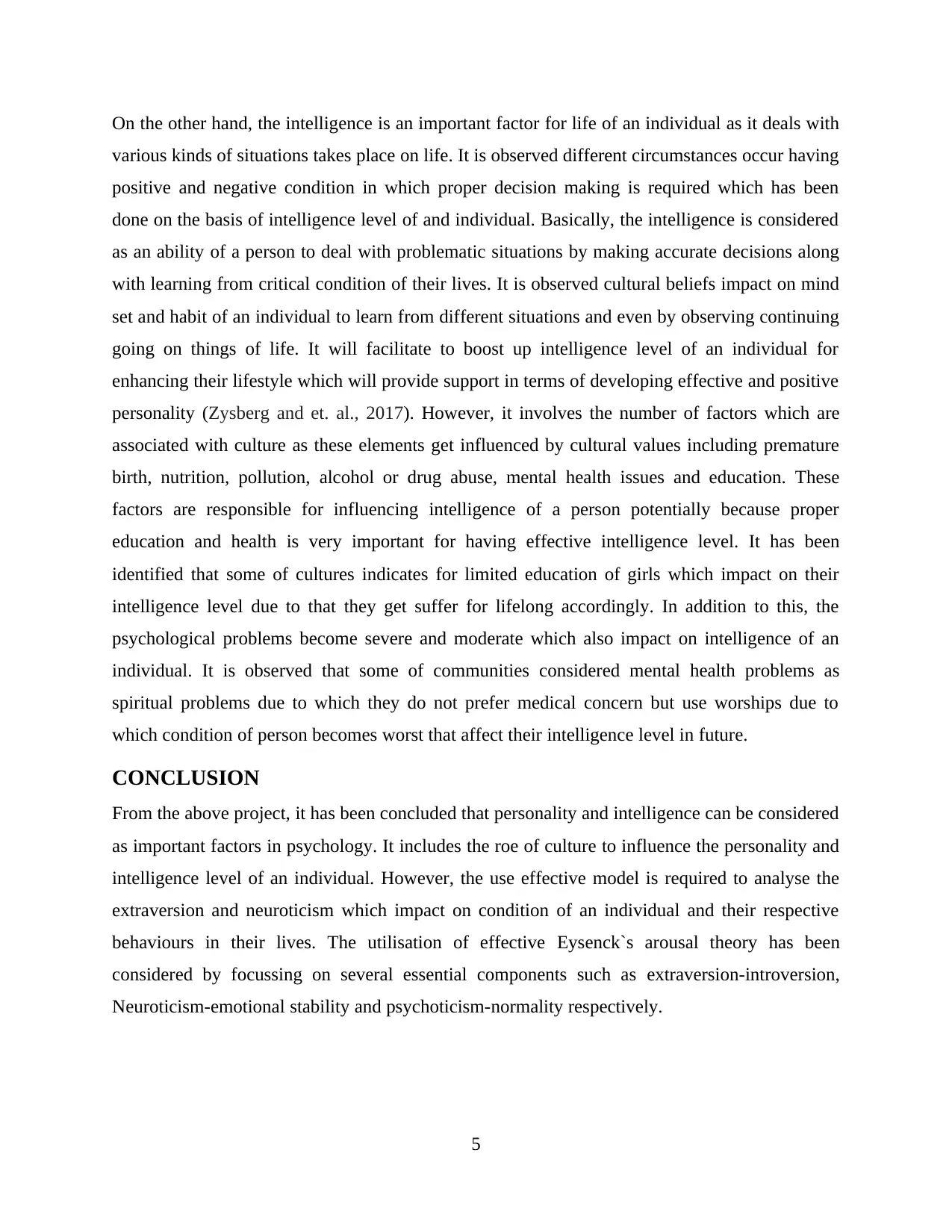
On the other hand, the intelligence is an important factor for life of an individual as it deals with
various kinds of situations takes place on life. It is observed different circumstances occur having
positive and negative condition in which proper decision making is required which has been
done on the basis of intelligence level of and individual. Basically, the intelligence is considered
as an ability of a person to deal with problematic situations by making accurate decisions along
with learning from critical condition of their lives. It is observed cultural beliefs impact on mind
set and habit of an individual to learn from different situations and even by observing continuing
going on things of life. It will facilitate to boost up intelligence level of an individual for
enhancing their lifestyle which will provide support in terms of developing effective and positive
personality (Zysberg and et. al., 2017). However, it involves the number of factors which are
associated with culture as these elements get influenced by cultural values including premature
birth, nutrition, pollution, alcohol or drug abuse, mental health issues and education. These
factors are responsible for influencing intelligence of a person potentially because proper
education and health is very important for having effective intelligence level. It has been
identified that some of cultures indicates for limited education of girls which impact on their
intelligence level due to that they get suffer for lifelong accordingly. In addition to this, the
psychological problems become severe and moderate which also impact on intelligence of an
individual. It is observed that some of communities considered mental health problems as
spiritual problems due to which they do not prefer medical concern but use worships due to
which condition of person becomes worst that affect their intelligence level in future.
CONCLUSION
From the above project, it has been concluded that personality and intelligence can be considered
as important factors in psychology. It includes the roe of culture to influence the personality and
intelligence level of an individual. However, the use effective model is required to analyse the
extraversion and neuroticism which impact on condition of an individual and their respective
behaviours in their lives. The utilisation of effective Eysenck`s arousal theory has been
considered by focussing on several essential components such as extraversion-introversion,
Neuroticism-emotional stability and psychoticism-normality respectively.
5
various kinds of situations takes place on life. It is observed different circumstances occur having
positive and negative condition in which proper decision making is required which has been
done on the basis of intelligence level of and individual. Basically, the intelligence is considered
as an ability of a person to deal with problematic situations by making accurate decisions along
with learning from critical condition of their lives. It is observed cultural beliefs impact on mind
set and habit of an individual to learn from different situations and even by observing continuing
going on things of life. It will facilitate to boost up intelligence level of an individual for
enhancing their lifestyle which will provide support in terms of developing effective and positive
personality (Zysberg and et. al., 2017). However, it involves the number of factors which are
associated with culture as these elements get influenced by cultural values including premature
birth, nutrition, pollution, alcohol or drug abuse, mental health issues and education. These
factors are responsible for influencing intelligence of a person potentially because proper
education and health is very important for having effective intelligence level. It has been
identified that some of cultures indicates for limited education of girls which impact on their
intelligence level due to that they get suffer for lifelong accordingly. In addition to this, the
psychological problems become severe and moderate which also impact on intelligence of an
individual. It is observed that some of communities considered mental health problems as
spiritual problems due to which they do not prefer medical concern but use worships due to
which condition of person becomes worst that affect their intelligence level in future.
CONCLUSION
From the above project, it has been concluded that personality and intelligence can be considered
as important factors in psychology. It includes the roe of culture to influence the personality and
intelligence level of an individual. However, the use effective model is required to analyse the
extraversion and neuroticism which impact on condition of an individual and their respective
behaviours in their lives. The utilisation of effective Eysenck`s arousal theory has been
considered by focussing on several essential components such as extraversion-introversion,
Neuroticism-emotional stability and psychoticism-normality respectively.
5
Paraphrase This Document
Need a fresh take? Get an instant paraphrase of this document with our AI Paraphraser
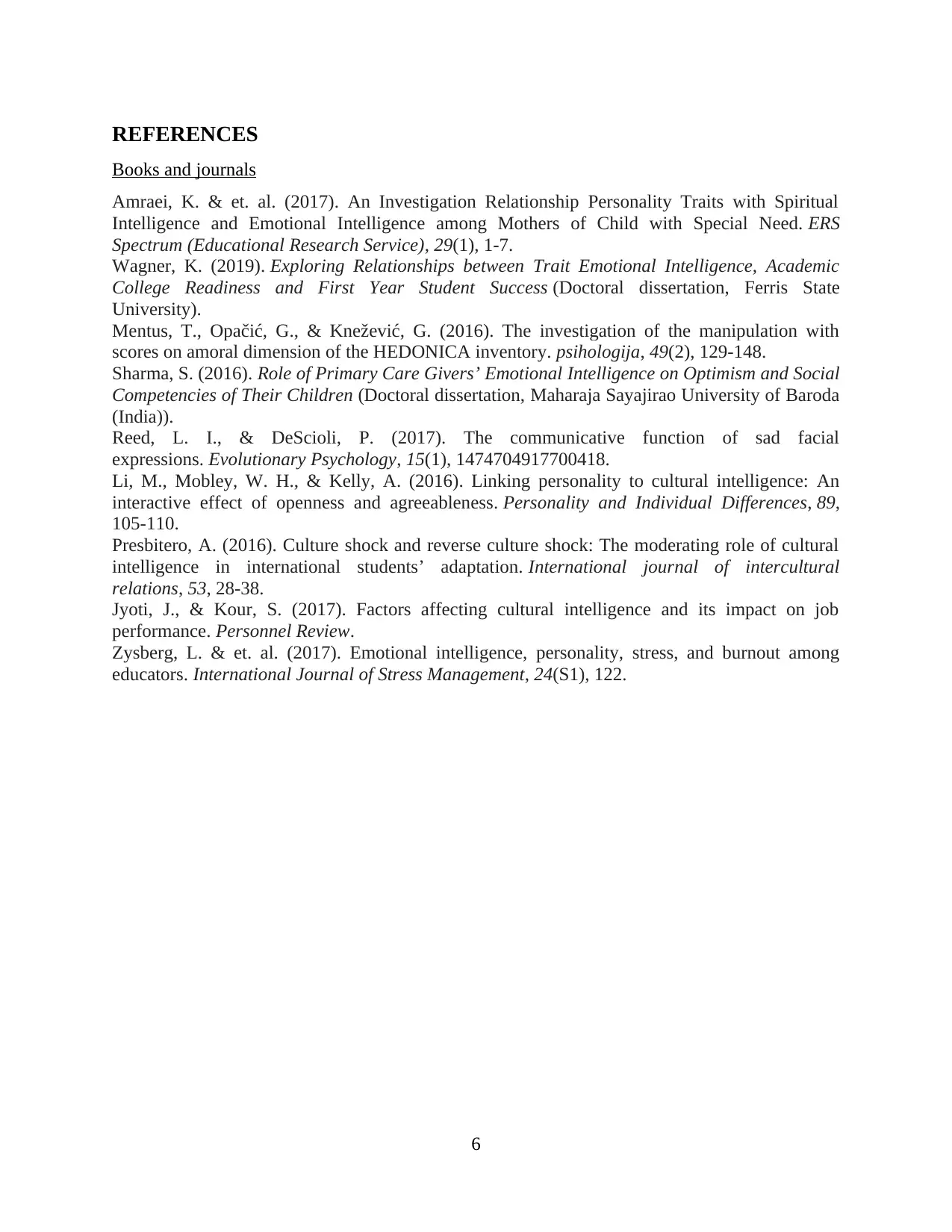
REFERENCES
Books and journals
Amraei, K. & et. al. (2017). An Investigation Relationship Personality Traits with Spiritual
Intelligence and Emotional Intelligence among Mothers of Child with Special Need. ERS
Spectrum (Educational Research Service), 29(1), 1-7.
Wagner, K. (2019). Exploring Relationships between Trait Emotional Intelligence, Academic
College Readiness and First Year Student Success (Doctoral dissertation, Ferris State
University).
Mentus, T., Opačić, G., & Knežević, G. (2016). The investigation of the manipulation with
scores on amoral dimension of the HEDONICA inventory. psihologija, 49(2), 129-148.
Sharma, S. (2016). Role of Primary Care Givers’ Emotional Intelligence on Optimism and Social
Competencies of Their Children (Doctoral dissertation, Maharaja Sayajirao University of Baroda
(India)).
Reed, L. I., & DeScioli, P. (2017). The communicative function of sad facial
expressions. Evolutionary Psychology, 15(1), 1474704917700418.
Li, M., Mobley, W. H., & Kelly, A. (2016). Linking personality to cultural intelligence: An
interactive effect of openness and agreeableness. Personality and Individual Differences, 89,
105-110.
Presbitero, A. (2016). Culture shock and reverse culture shock: The moderating role of cultural
intelligence in international students’ adaptation. International journal of intercultural
relations, 53, 28-38.
Jyoti, J., & Kour, S. (2017). Factors affecting cultural intelligence and its impact on job
performance. Personnel Review.
Zysberg, L. & et. al. (2017). Emotional intelligence, personality, stress, and burnout among
educators. International Journal of Stress Management, 24(S1), 122.
6
Books and journals
Amraei, K. & et. al. (2017). An Investigation Relationship Personality Traits with Spiritual
Intelligence and Emotional Intelligence among Mothers of Child with Special Need. ERS
Spectrum (Educational Research Service), 29(1), 1-7.
Wagner, K. (2019). Exploring Relationships between Trait Emotional Intelligence, Academic
College Readiness and First Year Student Success (Doctoral dissertation, Ferris State
University).
Mentus, T., Opačić, G., & Knežević, G. (2016). The investigation of the manipulation with
scores on amoral dimension of the HEDONICA inventory. psihologija, 49(2), 129-148.
Sharma, S. (2016). Role of Primary Care Givers’ Emotional Intelligence on Optimism and Social
Competencies of Their Children (Doctoral dissertation, Maharaja Sayajirao University of Baroda
(India)).
Reed, L. I., & DeScioli, P. (2017). The communicative function of sad facial
expressions. Evolutionary Psychology, 15(1), 1474704917700418.
Li, M., Mobley, W. H., & Kelly, A. (2016). Linking personality to cultural intelligence: An
interactive effect of openness and agreeableness. Personality and Individual Differences, 89,
105-110.
Presbitero, A. (2016). Culture shock and reverse culture shock: The moderating role of cultural
intelligence in international students’ adaptation. International journal of intercultural
relations, 53, 28-38.
Jyoti, J., & Kour, S. (2017). Factors affecting cultural intelligence and its impact on job
performance. Personnel Review.
Zysberg, L. & et. al. (2017). Emotional intelligence, personality, stress, and burnout among
educators. International Journal of Stress Management, 24(S1), 122.
6
1 out of 8
Related Documents
Your All-in-One AI-Powered Toolkit for Academic Success.
+13062052269
info@desklib.com
Available 24*7 on WhatsApp / Email
![[object Object]](/_next/static/media/star-bottom.7253800d.svg)
Unlock your academic potential
Copyright © 2020–2026 A2Z Services. All Rights Reserved. Developed and managed by ZUCOL.





